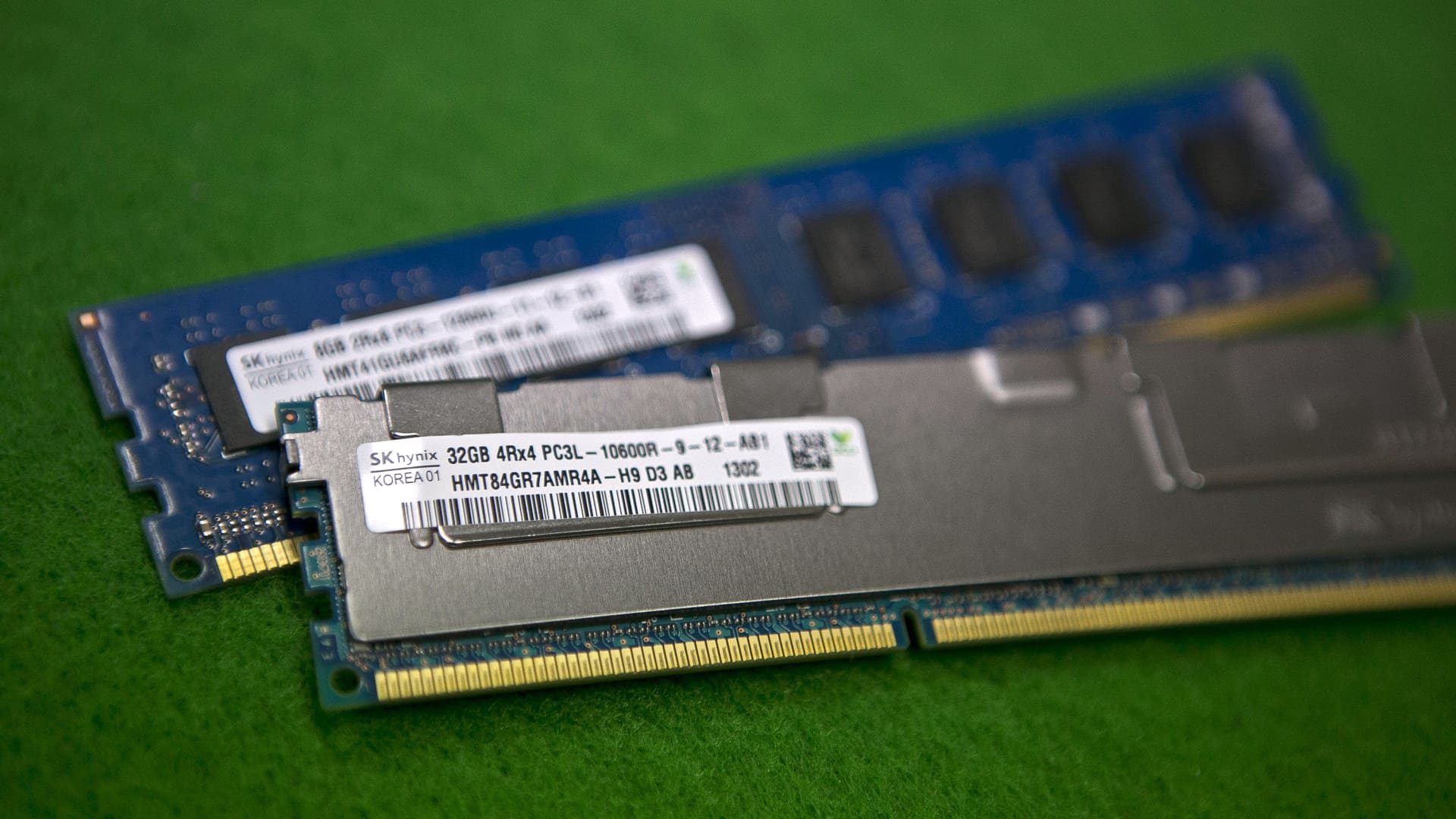Big Tech names like Nvidia have been on fire, thanks to the artificial intelligence boom — and other chipmakers are sharing the limelight. The supply chain for AI is extensive. It includes companies in Asia-Pacific and ranges from producers of AI graphics processing units to printed circuit boards. Memory chips in particular have been in the spotlight as AI ramps up. For example, memory with high performance and bandwidth is used in Nvidia’s H100 graphics processing units. GPUs underpin most generative AI tools, and Nvidia’s GPUs dominate the market. Two stocks have dominated the memory chip market: Samsung and SK Hynix . Samsung is the world’s largest manufacturer of dynamic random-access memory chips. DRAM is a type of semiconductor memory needed for data processing. But SK Hynix is a strong contender in the space: It said on March 19 that it became the first in the industry to mass produce HBM3E (high bandwidth memory 3E), the next generation of high-bandwidth memory chips used in AI chipsets. SK Hynix is already the primary supplier of HBM3 chips to Nvidia’s AI chipsets. Both South Korean companies reported earnings in late April. Samsung beat expectations , with operating profit for the first quarter soaring more than 900%. SK Hynix broke its run of net losses for five consecutive quarters , logging a net profit of 1.92 trillion South Korean won ($1.39 billion) in the first quarter. Which is the better play on the AI boom? CNBC Pro spoke to the pros to find out. SK Hynix Trent Masters, global portfolio manager at Alphinity Investment Management, says he prefers SK Hynix. “First I think their early leadership in HBM3 stands them in good stead with customers as HBM demand continues to increase materially,” he said. He added, “While Samsung and Micron are starting to close the technology gap, the trust and dependability of SK Hynix during the initial HBM ramp will ensure that they will retain a strong presence with these customers into the future.” SK Hynix’s recent partnership with TSMC to develop HBM4 will also position it as a leader again as this technology goes through its iterations, said Masters. Mass production of the HBM4 chips is expected to start in 2026. “Also, I prefer SK Hynix over Samsung as it is the pure memory play,” Masters said, adding that Samsung is a “much more sprawling” conglomerate spanning smartphones, TVs and other products. “A view of memory market strength (HBM demand and tight legacy DRAM markets leading to pricing strength) is best reflected through ownership of SK Hynix,” he said. Nam Hyung Kim, partner at Arete Research, also prefers SK Hynix, giving it a buy rating and Samsung a neutral rating. “SK Hynix stands out as a pure-play memory stock with leadership in AI technology, dominating the High Bandwidth Memory (HBM) market, which is crucial for AI servers,” he said. “Samsung, in contrast, is attempting to catch up.” Nam also pointed out that SK Hynix has higher profit margins in the sector than Samsung. He noted that Samsung’s portfolio includes more than memory, with over half of its sales derived from low-value consumer appliances, TVs and smartphones. In addition, he said that Samsung’s foundry business is facing “ongoing challenges.” “Consequently, we recommend investors remain cautious with Samsung and consider pure-play memory firms like SK Hynix until Samsung can showcase renewed technological leadership in memory,” Nam said. Over the past 12 months and year-to-date, SK Hynix has “significantly outperformed” Samsung in terms of stock price, he noted. “We anticipate this trend will continue throughout the upcoming memory up-cycle.” Samsung But the buying opportunity for each stock also depends on timing, according to one analyst. Sung Kyu Kim, analyst at Daiwa Capital Markets, said he has buy ratings for both Samsung and SK Hynix on the “strong” memory upturn cycle. Though SK Hynix maintained its HBM3 leadership last year, he sees “intensifying competition” in HBM3E in the second half of this year and 2025. In conclusion, he prefers Samsung, predicting it will catch up in the near term and will have more upside to its stock price. “[But I] also anticipate a buying opportunity on SK Hynix once it is adjusted due to intensifying competition in HBM3E,” said Kim. — CNBC’s Sheila Chiang contributed to this report.
Samsung or SK Hynix? One’s a better play on the AI boom, say pros

Denial of responsibility! Chronicles Live is an automatic aggregator of the all world’s media. In each content, the hyperlink to the primary source is specified. All trademarks belong to their rightful owners, all materials to their authors. If you are the owner of the content and do not want us to publish your materials, please contact us by email – chronicleslive.com. The content will be deleted within 24 hours.
